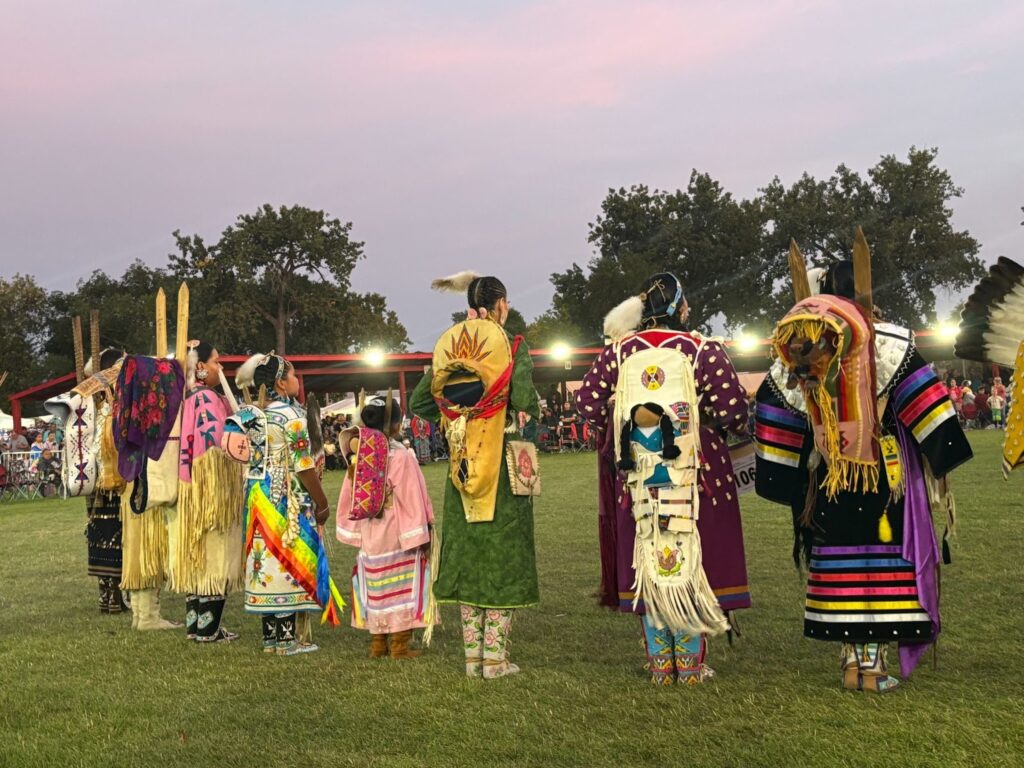
Sophia Turning Robe usually competes in contests as a jingle dress dancer, but for the CradleBoard Special on Sept. 7 at the United Tribes powwow the Siksika Nation citizen wanted to showcase her family history. (Photo credit/ Adrianna Adame)
Sophia Turning Robe finds serenity in the dance circle, where her worries vanish as she immerses herself in the moment. She and her family often leave their home in Spokane, Wash. to traverse the country on the powwow trail year-round, blending cultural tradition with family connections.
“I would say that when I’m dancing, it feels like everything just stops,” said the Siksika Nation citizen. “All of my worries, concerns or stresses just fade away and I can be really present in the moment. It just makes me appreciate that there’s a moment in time where I’ll never be able to live that moment again. Living in the moment feels like I’m exactly where I’m supposed to be with who I’m supposed to be.”
On Sept. 7, she danced in the Women’s Cradleboard Special during the United Tribe Technical College powwow as thousands of people watched the women dance with cradles on their backs. Debbie Hemplier sponsored the contest in honor of her late mother, Gladys Hempler, who died in March 2023. The sponsors especially recognized mothers, such as Gladys, as givers of life.
Many Indigenous tribes in North America use cradleboards, traditional baby carriers designed to protect the baby’s spine, and often cover them with blankets or animal skins. Women danced with cradleboards on their backs during the contest, many representing different regions and tribal cultures.

This was the United Tribes International Powwow’s first time hosting this special, which honors mothers and the sacredness of life. Mothers often lined the bottom of the cradleboard with sweetgrass and sage, which acted as a protective barrier for the child.
During the event, Turning Robe performed in the Plateau women’s style of dance. Usually she competes in contests as a jingle dress dancer, but for this special she wanted to showcase her family history.
Every dancer’s regalia holds meaning, Turning Robe said. The design, style, accessories and colors of each dancer’s regalia hold deep cultural significance. She wore a striking green dress and otter fur hair ties and carried an eagle tail feather fan –– a gift from her grandfather. Someone gave her the otter fur during a ceremony in British Columbia. “Green is one of my family colors,” she said. “It represents summertime within our family. Our family colors are white, gray, black and green. So anything I can get my hands on that’s green, I love it.”
One of the reasons Turning Robe likes performing in the special is because she gets to dance with a piece of family history. “That cradleboard has been in our family for a while now,” she said. “My mom had it made probably about 30 years ago. My two other siblings, us three kids, have been in that cradleboard.”
She also dances to represent the people of the Plateau area, in addition to showcasing her family’s board. “I was raised in powwow dancing,” she said. “It was just something that my family and I did. My mom danced when she was younger and then stepped away from it. When my siblings and I were young, she would get us dressed and bring us to different powwows.”
“I would say that when I’m dancing, it feels like everything just stops. All of my worries, concerns or stresses just fade away and I can be really present in the moment.”
Sophia Turning Robe, Siksika Nation jingle dress dancer
She and her family travel nationwide and year-round on the powwow trail. They began the year at the Pechanga Resort and Casino Powwow in Temecula, Calif., and continued to university gatherings in the spring, including those at the University of Washington, the University of Idaho, Montana State University, and the University of Montana. In July, they attended the Wildhorse 28th Annual Powwow in Pendleton, Ore.
During the summer, they typically stay in the Northwest, but this year, in August, they ventured to Rocky Boy Powwow near Havre, Mont. As the weather cools, they return to California for the fall and winter. Although Turning Robe had talked about attending the United Tribes International Powwow for years, this year, she said she wouldn’t let the distance stop her.
The contest wasn’t Turning Robe’s first cradleboard dance. Earlier this summer she performed in a special for the first time at a powwow in Montana. When the flyer for 54th Annual United Tribes International Powwow was released, she decided to participate in the cradleboard special there.
Turning Robe didn’t place in the competition but said she had fun. The sponsors recognized dancers with prizes that included cash, star quilts and dresses designed by Norma Baker-Flying Horse, owner of Red Berry Woman, a Native fashion line. The clothing designer danced alongside Turning Robe and other contestants, but she didn’t compete for prizes.
Baker-Flying Horse told Buffalo’s Fire she danced in memory of Gladys Hempler and all women who bring life into the world. She also carried cradleboards for two of her children, including a daughter who died at 4 weeks old. “It was certainly healing,” she said.
Meanwhile, Turning Robe encourages everyone to get involved and enjoy the experience of dancing. For those new to it, she suggests finding local classes or attending powwows even if no classes are available nearby. “I’m a visual learner,” she said. “I watch the dancers closely and try to imitate their moves.”
The jingle dress dancer also knows how scary competing in the arena can be. Turning Robe wants to let people of all ages know, especially youth, they have nothing to fear.
“When I was younger, I was really worried about people watching and judging me,” she said. Now, she realizes everyone is putting themselves out there and there’s no reason to worry.
Jodi Rave Spotted Bear contributed to this story.

